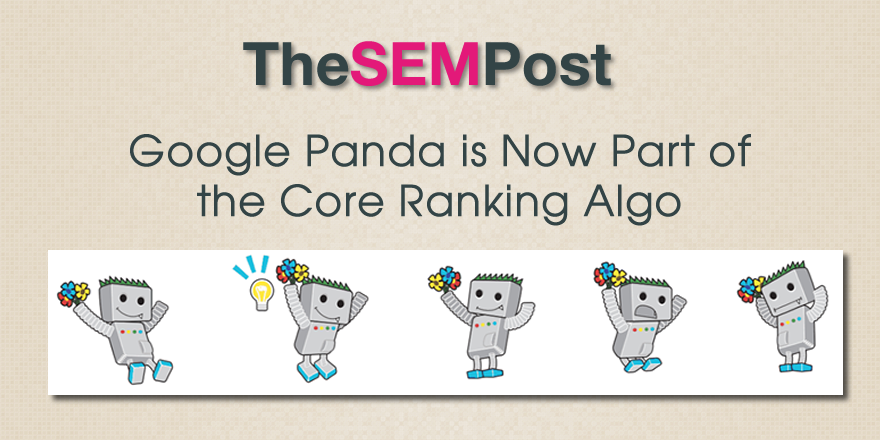 One of the most noteworthy things I covered in yesterday’s massive Understanding Google Panda: Definitive Algo Guide for SEOs was the fact that Panda is now part of Google’s core ranking algo. In other words, it is what many of us call “baked in” the Google core algo, not a spam filter applied after the core did its work.
One of the most noteworthy things I covered in yesterday’s massive Understanding Google Panda: Definitive Algo Guide for SEOs was the fact that Panda is now part of Google’s core ranking algo. In other words, it is what many of us call “baked in” the Google core algo, not a spam filter applied after the core did its work.
This isn’t unexpected. When Google began rolling out the very, very slow Panda update last year, many of us speculated that maybe it was being rolled into the core ranking algo, and a Google spokesperson confirmed to us that this is true. “Panda is an algorithm that’s applied to sites overall and has become one of our core ranking signals. It measures the quality of a site, which you can read more about in our guidelines. Panda allows Google to take quality into account and adjust ranking accordingly.”
When Panda first launched (and initially known as Farmer, for those who want to go digging through the archives) was a separate spam filter. This meant that it was a filter that was applied to the search results after the core ranking algo as a completely separate piece. But now, Panda is rolled into the core ranking algo.
This also means that core ranking algo changes, such as the one we have been seeing over the last few days that Google confirmed is NOT Penguin, could technically be Panda, although we have no confirmation of whether it is or isn’t. But now there is a possibility of any core ranking changes could be connected to Panda.
If you haven’t read Understanding Google Panda: Definitive Algo Guide for SEOs, it is worth reading for some very detailed information, along with numerous new quotes directly from Google on just about everything there is to know about Panda.
Added: There have been some rumors going around that core algo = real time. Google simply told me it was core, no mention was made to it being real time.
John Mueller also confirmed it wasn’t real time in today’s Hangout, and Gary Illyes said the same on Twitter.
@dr_pete OK.The real time p stuff is wrong. We had a core algo update, and independently we revealed more about panda through @TheSEMPost
— Gary Illyes (@methode) January 12, 2016
Bob says
Hi Jennifer, your last link in the post is the wrong URL
Jennifer Slegg says
Fixed earlier
Heckler says
FYI – Your link to ‘Understanding Google Panda: Definitive Algo Guide for SEOs’ is an edit link:
http://www.thesempost.com/wp-admin/post.php?post=9967&action=edit
Jennifer Slegg says
Fixed earlier… I grabbed the wrong link of my list of posts in the admin panel
Jack says
So in your mind, Jennifer, is there any significance in Panda being part of the core algo for webmasters? Obviously that it’s not a filter makes a difference on Google’s end, but as core =/= real time, this part of the algorithm is likely still reliant on intermittent data updates, which means ultimately a similar (potential for increased frequency aside) experience for webmasters.
Jennifer Slegg says
I never said it was real time, someone jumped to that conclusion and tweeted it, and it went around like wildfire Google also confirmed it is not real time.
Google also confirmed it is not real time.
Jeff says
Thank you, Jennifer, for this update. Do you think Google will do the same for Penguin? I mean, make Penguin part of the core?
rigseo says
Hi Jennifer,
Gone thru your articleon Panda, one thing haunts, if a site have 100 pages, 50 good quality & also in word quantity also, but 50 thin. So thin content 50 pages should be noindexed? If not done, then good 50 will be penalised too?
One big issue .. now 400 to 500 word onwards articles are treated good by Google, so to the point short answers or articles are hardly found. Rather articles getting unnecessarily lenghthy just to fulfil Google algo.. its terrific.
What u say?
Jonathan Jones says
Jennifer,
So it’s part of the core algorithm – but doesn’t mean that it’s working in real-time. Got that. What’s the Does this just mean they are able to refresh Panda more frequently?
Hammad Hussain says
Jennifer Slegg can we relate this “core algo update” with rank brain or not as Rank Brain is totally machine-learning artificial intelligence system and also the Third most important signals now in Google ranking. So as you mention in your post that “Panda is an algorithm that’s applied to sites overall and has become one of our core ranking signals So my questions is can we relate these two updates together or not.
Mirza Atif says
What Google says doesn’t matter, it is write or wrong, because they are neither dependent nor responsible to updates their search engine. They only claim, if you want traffic from us, follow our principles. Google has done a lot of work in advance and implementing and testing for long time and will too. The point is, how much we are following their standards to get search results, what they call search engine optimization basically and which is considered as to be a core ranking algorithm i think. You name it any animal. Rest of tactics and ways are off-page ranking signals, which are about to hit in next step. Any major ranking signal make assigned name, rest are baked in core.